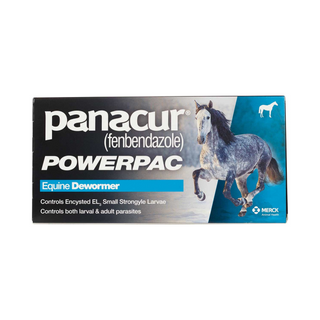
Description
10% Fenbendazole paste. Panacur PowerPac Paste Horse Dewormer is the only FDA approved treatment for all stages of encysted small strongyles. Because strongyles represent up to 90% of a horse's worm burden, it is important to treat all horses with PowerPac horse dewormer 1-2 times per year.
Each Panacur PowerPac horse dewormer treatment contains five 57 gram (double-dose) syringes of Fenbendazole. Administer 1 syringe per 1250 lbs daily for 5 consecutive days. Each gram of paste 10% contains 100 mg Fenbendazole. Apple-cinnamon flavored.
The condition referred to as "hay belly" is often an abdomen infested with encysted strongyles, and may not be properly treated with regular horse deworming. In many climates, the most advantageous times for use are spring and fall, to eliminate the horse's worm load before and after exposure to pasture. for the control of large strongyles, encysted early third stage, late third stage and fourth stage cyathostome larvae, small strongyles, pinworms, ascarids and arteritis caused by 4th stage larvae of Strongylus vulgaris in horses.
Each Panacur PowerPac horse dewormer treatment contains five 57 gram (double-dose) syringes of Fenbendazole. Administer 1 syringe per 1250 lbs daily for 5 consecutive days. Each gram of paste 10% contains 100 mg Fenbendazole. Apple-cinnamon flavored.
The condition referred to as "hay belly" is often an abdomen infested with encysted strongyles, and may not be properly treated with regular horse deworming. In many climates, the most advantageous times for use are spring and fall, to eliminate the horse's worm load before and after exposure to pasture. for the control of large strongyles, encysted early third stage, late third stage and fourth stage cyathostome larvae, small strongyles, pinworms, ascarids and arteritis caused by 4th stage larvae of Strongylus vulgaris in horses.
Description
10% Fenbendazole paste. Panacur PowerPac Paste Horse Dewormer is the only FDA approved treatment for all stages of encysted small strongyles. Because strongyles represent up to 90% of a horse's worm burden, it is important to treat all horses with PowerPac horse dewormer 1-2 times per year.
Each Panacur PowerPac horse dewormer treatment contains five 57 gram (double-dose) syringes of Fenbendazole. Administer 1 syringe per 1250 lbs daily for 5 consecutive days. Each gram of paste 10% contains 100 mg Fenbendazole. Apple-cinnamon flavored.
The condition referred to as "hay belly" is often an abdomen infested with encysted strongyles, and may not be properly treated with regular horse deworming. In many climates, the most advantageous times for use are spring and fall, to eliminate the horse's worm load before and after exposure to pasture. for the control of large strongyles, encysted early third stage, late third stage and fourth stage cyathostome larvae, small strongyles, pinworms, ascarids and arteritis caused by 4th stage larvae of Strongylus vulgaris in horses.
Each Panacur PowerPac horse dewormer treatment contains five 57 gram (double-dose) syringes of Fenbendazole. Administer 1 syringe per 1250 lbs daily for 5 consecutive days. Each gram of paste 10% contains 100 mg Fenbendazole. Apple-cinnamon flavored.
The condition referred to as "hay belly" is often an abdomen infested with encysted strongyles, and may not be properly treated with regular horse deworming. In many climates, the most advantageous times for use are spring and fall, to eliminate the horse's worm load before and after exposure to pasture. for the control of large strongyles, encysted early third stage, late third stage and fourth stage cyathostome larvae, small strongyles, pinworms, ascarids and arteritis caused by 4th stage larvae of Strongylus vulgaris in horses.

